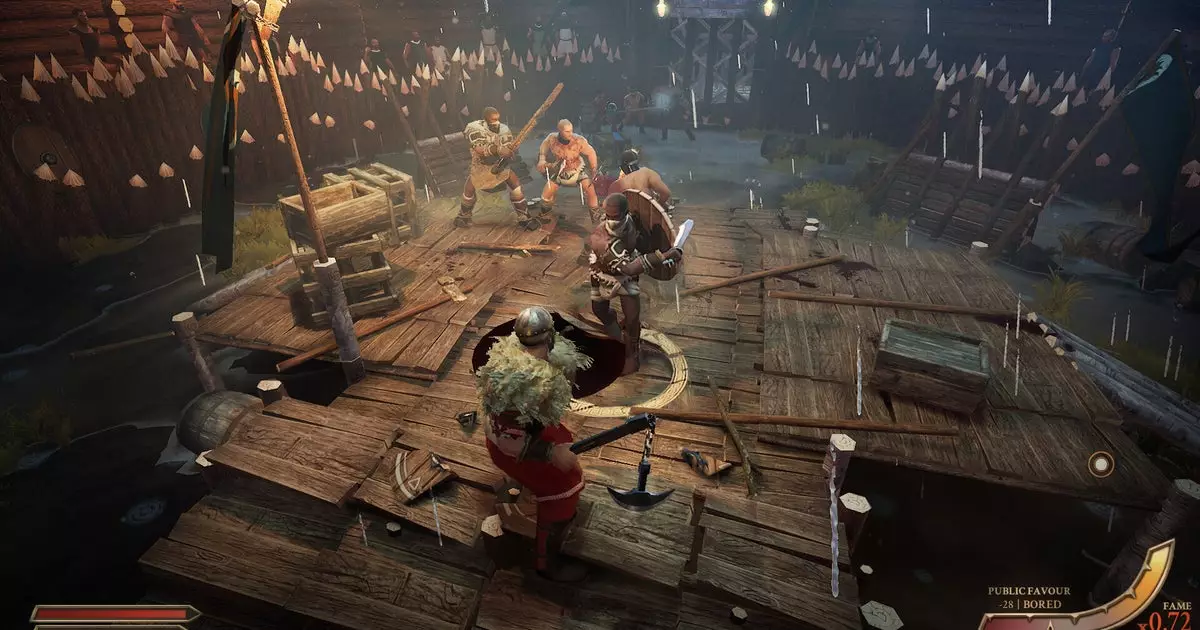In the dynamic realm of indie gaming, few titles manage to catch the collective imagination of players quite like “We Who Are About To Die.” This roguelike RPG challenges players to navigate the treacherous world of gladiatorial combat while managing character development and tactical encounters. The recent update promises significant changes and a celebratory discount, further enticing longtime fans and newcomers alike. However, this article aims to delve deeper into the core mechanics and overall player experience that define this remarkable title.
At its heart, “We Who Are About To Die” is characterized by a distinctive approach to combat that skillfully combines accessibility with depth. Players will find themselves immersed in a fast-paced battle system reminiscent of classic titles such as “Chivalry 2” and “Kingdom Come: Deliverance.” The streamlined swordplay enables intuitive directional slashes, making the combat feel both fluid and responsive.
However, this engaging method can also present considerable challenges. New players, much like myself, often flounder in the initially chaotic melee scenarios. The game encourages a defensive stance, where targeting an opponent’s weapon becomes crucial for countering attacks. While this creates opportunities for tactical play, it also underscores the learning curve that players must navigate. Despite initial clumsiness, the combination of flailing limbs and comedic physics contributes to an oddly satisfying experience, where one can experience both victory and hilarity in tandem.
In a game where combat reigns supreme, it’s easy to overlook the underlying systems that enhance the overall experience. “We Who Are About To Die” ingeniously weaves character management and resource allocation into the narrative tapestry of gladiatorial life. Players earn currency from battles, which must be strategically spent on improving gear, training, and gaining favor from patrons.
The relationship with these patrons is particularly noteworthy, as it directly influences not only payouts but also the unfolding of story events. This element adds an extra layer of immersion, as players feel the weight of their decisions in shaping their character’s destiny within the arena. Players who aspire to ascend the ranks will soon realize that mere prowess with weapons isn’t enough; they must also cultivate their status within the vibrant culture of gladiatorial combat.
An enticing aspect of “We Who Are About To Die” lies in its continuous evolution. The recent patch adds a wealth of major new content and features aimed at enhancing replayability and depth. Notably, the introduction of character traits allows players to customize their experience significantly. With over 50 random traits now available, each playthrough can feel distinct and offer fresh challenges.
Furthermore, the newly established weight system introduces classes of characters that can change the dynamics of combat. Players can choose between light and heavy classes, allowing for varied strategic approaches to fights. The addition of bonus skills, giving characters the ability to exceed the usual skill level cap, only enriches this system.
The inclusion of brand new maps, like the City Market and City Slums, expands the gaming world and provides players with diverse settings to explore. Not to mention, the addition of ambush events heightens the intensity of encounters, keeping players on their toes and further integrating story elements into combat.
As I reflect on my initial experiences with “We Who Are About To Die” and its latest developments, it becomes apparent that this title offers both breadth and depth unseen in many indie games. The unique blend of tactical engagement, character development, and charming unpredictability creates an enthralling experience that captivates and challenges players.
While the laughter stemming from comically botched attacks adds a layer of entertainment, it is the overall gameplay mechanics and systems that stand as the foundation of a truly engaging RPG. Whether players are driven by the urge to improve their skills or simply wish to enjoy the absurdity of gladiatorial life, “We Who Are About To Die” remains a worthy investment for those seeking an engaging and rich gaming experience.

